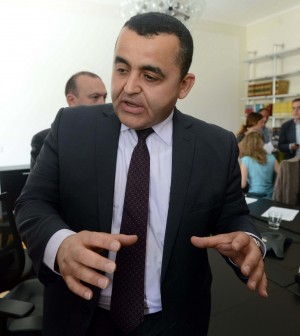By Ismail Suayah.
North Carolina, USA, November 2012
Libya was so oppressive under Qaddafi that even those who served the regime sought to escape the . . .[restrict]country, and so government positions abroad were highly sought after by Qaddafi loyalists. Embassy posts in particular were highly competitive; ambassadorships and other high-profile positions were often reserved for those who climbed the ranks of Qaddafi’s revolutionary committees by spreading propaganda, pushing oppressive policies, and otherwise proving their allegiance to the “Brother Leader.”
Libya’s General National Congress (GNC) faced difficult decisions as it voted for Libya’s ministerial cabinet. Some cabinet nominees served the deposed regime for decades before siding with the anti-Qaddafi rebellion in 2011, and so their nominations are highly controversial for citizens like me still reeling from the effects the deposed regime. To rebuild the country, Libya needs all of its human resources – including Qaddafi-era technocrats who have useful skills to offer. But to reward these individuals with high-profile government positions in the new Libya is to condone their loyalty to the deposed regime.
To celebrate the first anniversary of Libya’s uprising against the Qaddafi regime, our family drove for seven hours to Washington DC, navigating rush hour traffic and enduring impatient inquiries from our six-year-old son, who leaned forward every few minutes to ask: are we there yet?
The Libyan embassy to the United States in Washington DC remains as dysfunctional as the regime that it served for four decades, with its bureaucracy, antiquated web site, impenetrable phone system and total disconnect from the Libyan community outside of the DC metropolis. The event, sponsored by the Libyan embassy, had only been brought to my attention a few days earlier by a Libyan friend who forwarded me an email invitation. Since the uprising began, Libyans in the United States had grown accustomed to being asked on short notice to participate in faraway events.
Arriving at the hotel just before the party began, our family rushed to change into our celebratory attire. I was excited to celebrate Libya’s freedom with my fellow citizens, and after decades of isolation from fellow Libyans, I was eager to introduce my American wife and kids to my Libyan-American community.
Guests formed a long line as they were ushered into the dining hall past Libya’s ambassador, Ali Al-Aujali, who shook each guest’s hand and smiled brightly as a photographer stood by. I had mixed feelings when he grabbed my hand and held it, without making eye contact, waiting for the camera flash. I felt as if I was being used as a prop to present Mr Aujili as a man of the people. His behaviour also seemed egocentric and misguided; I recall thinking that this celebration was about the Libyan people, not about him.
Later that evening, I made a prediction to my wife: Mr Aujali would be replaced by the end of the year. I was shocked to recently discover that instead he has been nominated to serve as Libya’s foreign minister. If the information about Mr Aujali on Wikipidia (http://en.wikipedia.org/wiki/Ali_Aujali) is true, he served the Qaddafi regime — and benefitted from it — for forty years, along the way holding coveted posts in England, Malaysia, South American, Canada and the United States.
Mr Aujili was an early, high-profile defector when the Libyan uprising began, and his defection — along with the defection of other Libyan ambassadors — helped garner international support for the uprising. For that, he and other high-profile defectors should be commended. But to nominate such controversial people to leadership positions in the new Libya threatens the stability of the country. This nomination is unsettling to most Libyans; emotions still run high against those who served the regime.
I beg to disagree with those who argue that Mr Aujili’s experience as a technocrat makes him valuable to Libya’s foreign ministry. Libya today needs technical managerial/administrative professionals who are capable of assembling and managing highly-qualified teams. The Qaddafi regime was known for rewarding greedy, self-serving, corrupt technocrats – not civil servants. The poor functioning of the Libyan embassy in Washington DC during Mr Aujili’s time, calls his leadership and management qualifications into question.
Perhaps Mr Aujili and others like him can better serve Libya by writing about the deposed regime. As former insiders, they are most qualified to tell the world the hidden truth of the Qaddafi regime. By telling their stories they could help Libyans to recover their history and to heal – an important, though less glamorous, service to their country.
Dr Suayah write occasionally for the Libya Herald. He is a former geo-marine scientist, currently working in the software industry. He lives in the United States in the state of North Carolina with his wife and two children.
The views expressed in Opinion articles do not necessarily reflect those of the Libya Herald.
[/restrict]




